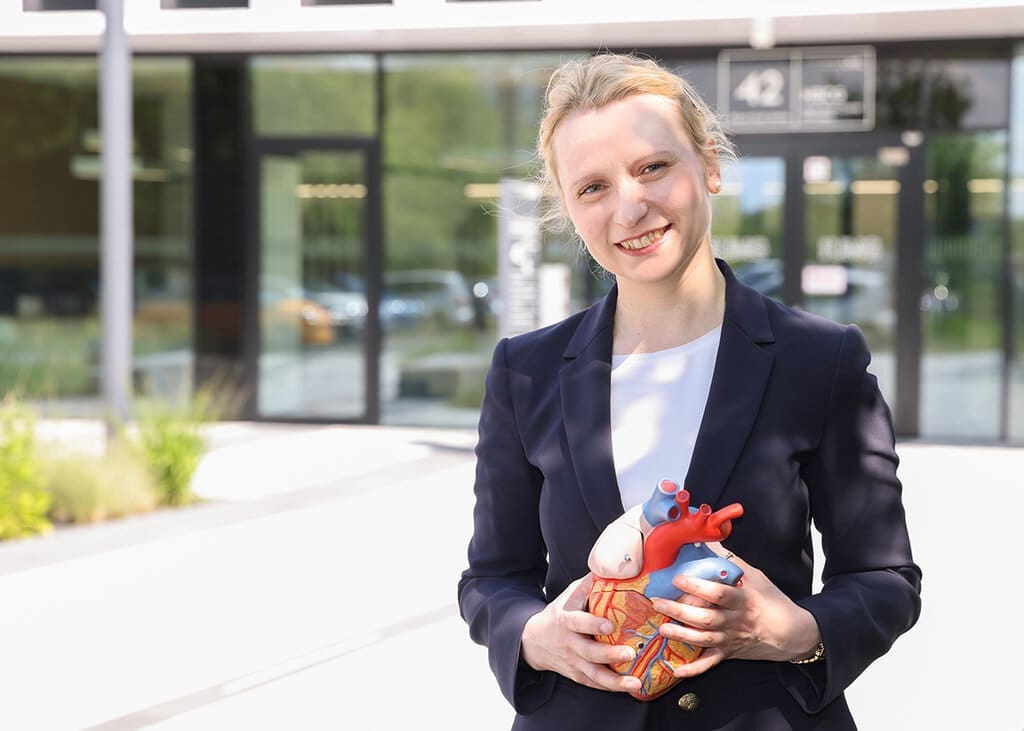PRESENTED: How Germany’s first and only female university professor of cardiology is driving translational medicine forward
Prof. Dr. Constanze Schmidt has been University Professor of Cardiology at the G├Čttingen Medical Faculty and Director of the Department of Cardiology and Pneumology at the University Medical Center G├Čttingen (UMG) since 1 July 2025. She succeeds Prof. Dr. Gerd Hasenfu├¤, who retired after 26 years, and is currently the only woman in Germany to hold a chair in cardiology. With her expertise in translational medicine and her focus on atrial cardiomyopathy, Schmidt is setting new standards in research, teaching and patient care.
As a clinician and researcher, Schmidt is pursuing the goal of strengthening translational medicine in order to quickly transfer research findings into patient care. “Translational research in cardiovascular medicine is an essential building block for improving patients’ lives,” she emphasizes. Her focus is on atrial cardiomyopathy, a disease of the heart’s atria that can trigger atrial fibrillation or strokes. In particular, her work focuses on the role of two-port domain (K2P) potassium channels, which are crucial for electrical conduction in the heart. She identified the TASK-1 channel as a regulator of the atrial action potential, the overproduction of which favors atrial fibrillation. In a project funded by the German Heart Foundation, she developed a specific inhibitor that suppressed atrial fibrillation in animal models. Initial clinical tests (DOCTOS study) show promising results. “This systematic pursuit from the identification of an ion channel to a therapeutically applicable drug is a core part of my research,” explains Schmidt.

Her approach to interventional electrophysiology is also innovative. She has developed “heart tattoos” made of silver or gold that improve tissue conductivity in order to permanently correct arrhythmias such as atrial fibrillation or bundle branch blocks. This procedure, funded by the EU’s HORIZON 2020 program, is about to be used for the first time in humans.
In teaching, Schmidt relies on interactive formats such as problem-based learning and bedside teaching to motivate students to apply their knowledge independently. “Lectures should be a professional freedom of activity, not a rigid framework,” she says. Her aim is to get young doctors excited about translational cardiac medicine and provide them with the necessary skills.
Born in L├╝neburg in 1983, Schmidt studied human medicine and physics in G├Čttingen, obtained her doctorate in 2011 and habilitated in Heidelberg in 2017 on the subject of K2P potassium channels. After working as an assistant and senior physician in Heidelberg, where she was awarded the Else Kr├Čner Clinician Scientist Professorship in 2022, she returned to G├Čttingen. Her career is characterized by numerous awards, including the national victory in “Jugend forscht” in 2001, the Oskar Lapp Research Prize in 2016 and the Science Prize of the Gertrud Spitz Foundation in 2023. She is a member of renowned professional societies such as the German Society of Cardiology (DGK), the German Center for Cardiovascular Research (DZHK) and the European Society of Cardiology (ESC).
With her vision of further developing the Heart & Brain Center G├Čttingen and researching the interface between the heart and brain, Schmidt is positioning herself as a pioneer in cardiology. Her work promises to sustainably improve the treatment of cardiac arrhythmias and heart failure and to advance translational medicine in Germany.
The articles in the news section are produced by X-Press journalist office
Gender note. The personal designations used in this text always refer equally to female, male and diverse persons. Double/triple references and gendered designations are avoided in favor of better readability. t




